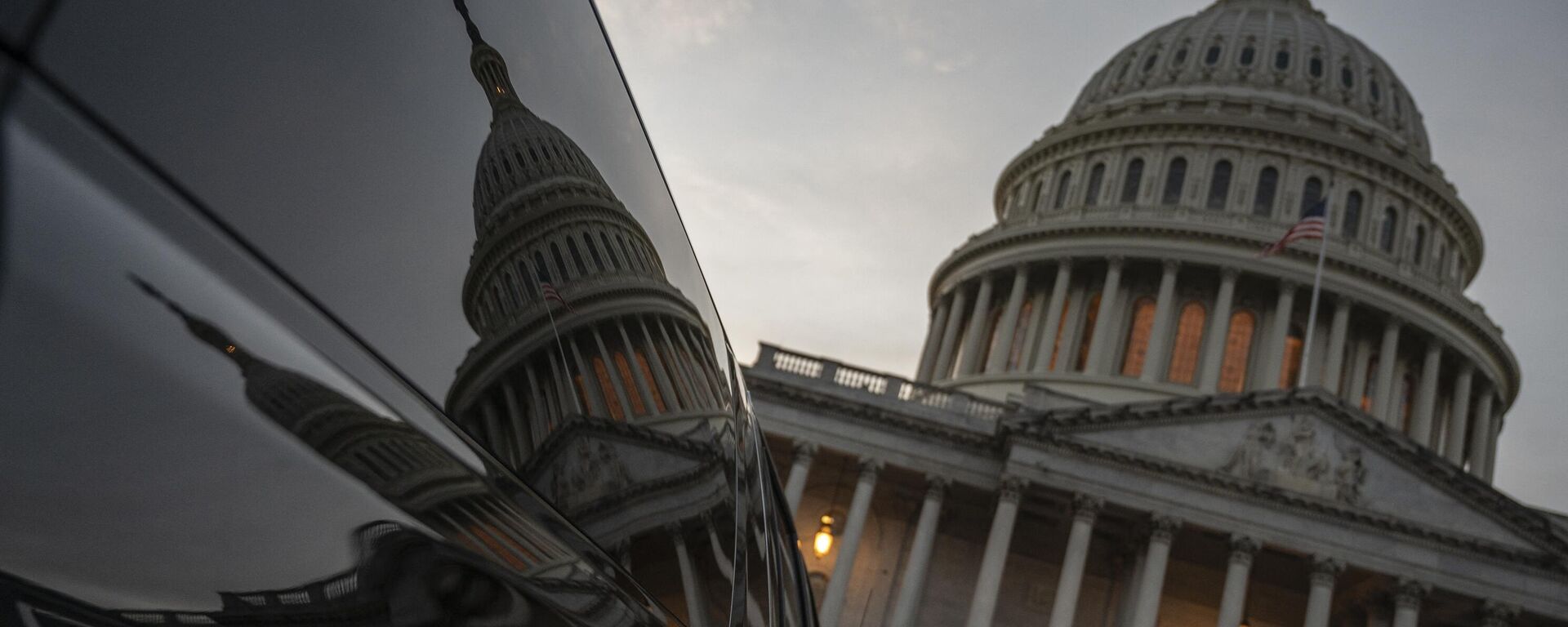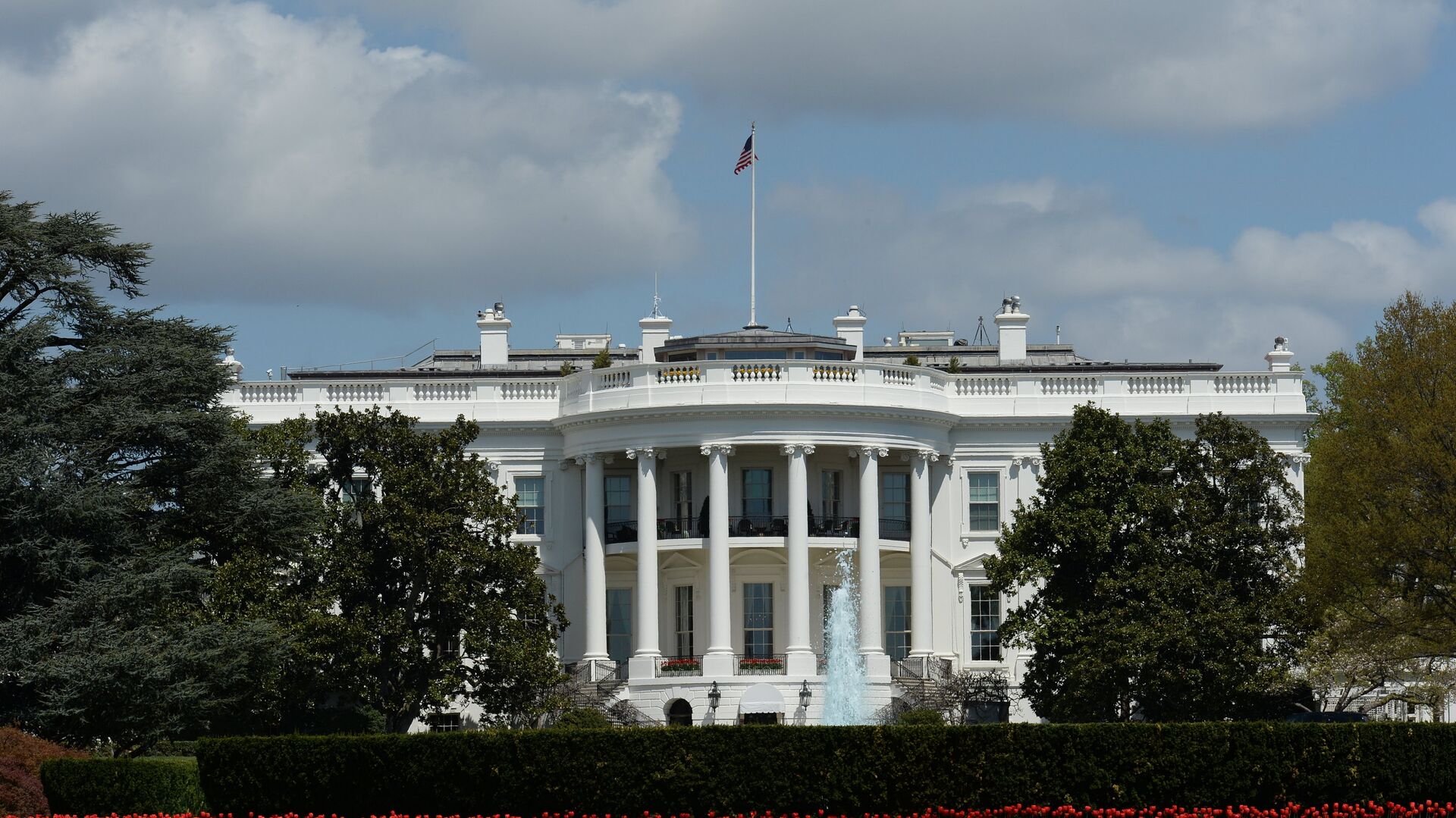https://sputnikglobe.com/20230423/some-white-house-officials-concerned-over-serious-possibility-of-default---report-1109778588.html
Some White House Officials Concerned Over ‘Serious Possibility' of Default - Report
Some White House Officials Concerned Over ‘Serious Possibility' of Default - Report
Sputnik International
US House Speaker Kevin McCarthy earlier berated President Joe Biden over unwillingness to discuss a debt ceiling increase to tackle a possible default.
2023-04-23T15:28+0000
2023-04-23T15:28+0000
2023-04-23T15:28+0000
americas
us
joe biden
kevin mccarthy
default
economy
https://cdn1.img.sputnikglobe.com/img/105607/76/1056077692_0:160:3077:1890_1920x0_80_0_0_3c1f93ec9c7877400a73ac3867914f4e.jpg
Some in the Biden administration allegedly don't agree with the White House's conclusion that “a doomsday scenario” of default is avoidable, a US media outlet has reported.The outlet quoted economists of leading global investment banking, securities and investment management firm Goldman Sachs as saying that due to weaker-than-expected tax revenues, the US could hit the debt ceiling already in early June.It also noted that “amid the simmering standoff over spending with the ticking time bomb of the debt ceiling in the background”, a number of Democrats continue urging President Joe Biden “to engage” Republican House Speaker Kevin McCarthy “sooner rather than later.”The claims come after McCarthy said last week that House Republicans would seek to pass a bill to lift the debt ceiling using budget compromises based on their spending priorities.The House speaker added that “without exaggeration, American debt is a ticking time bomb that will detonate unless we take serious, responsible action. Yet how has President Biden reacted to this issue? He has done nothing. Debt limit negotiations are an opportunity to examine our nation’s finances.”McCarthy accused Biden of jeopardizing US financial markets by delaying negotiations on a debt ceiling raise. In response, White House Press Secretary Karine Jean-Pierre said Congress has a constitutional obligation to address the debt limit and urged Republicans to “stop playing games” with the national economy.Last month, the two met to discuss raising the debt ceiling and other economic policy matters, stressing that they hope for further talks. McCarthy, in turn, reiterated Republican calls to address rising government spending before authorizing a higher borrowing limit.US Treasury Secretary Janet Yellen has, meanwhile, warned that the government failing to raise the debt ceiling could be catastrophic, and that the Treasury had already taken extraordinary measures ahead of a potential default on US financial obligations that may take place later this year.GOP members have been adamant in their refusal to support the debt ceiling increase unless it comes with corresponding spending cuts, mostly to domestic social spending, focusing on healthcare, labor, and education.The US’ debt ceiling has been stalled at $31.4 trillion since mid-January, when the newly-inaugurated Republican-controlled House declined to pass a bill lifting the spending limit. The GOP members then approached Democratic leaders with an offer to negotiate on spending cuts as a precondition for passing a new bill with a higher debt ceiling - an offer Democrats have so far rejected out of hand.
https://sputnikglobe.com/20230120/what-happens-if-us-defaults-on-its-debt-in-2023-1106511918.html
americas
Sputnik International
feedback@sputniknews.com
+74956456601
MIA „Rossiya Segodnya“
2023
Oleg Burunov
https://cdn1.img.sputnikglobe.com/img/07e4/09/0b/1080424846_0:0:2048:2048_100x100_80_0_0_3d7b461f8a98586fa3fe739930816aea.jpg
Oleg Burunov
https://cdn1.img.sputnikglobe.com/img/07e4/09/0b/1080424846_0:0:2048:2048_100x100_80_0_0_3d7b461f8a98586fa3fe739930816aea.jpg
News
en_EN
Sputnik International
feedback@sputniknews.com
+74956456601
MIA „Rossiya Segodnya“
Sputnik International
feedback@sputniknews.com
+74956456601
MIA „Rossiya Segodnya“
Oleg Burunov
https://cdn1.img.sputnikglobe.com/img/07e4/09/0b/1080424846_0:0:2048:2048_100x100_80_0_0_3d7b461f8a98586fa3fe739930816aea.jpg
us house speaker kevin mccarthy, us president joe biden, threat of us default, us' debt ceiling, mccarthy's criticism of biden over his unwillingness to discuss a possible default
us house speaker kevin mccarthy, us president joe biden, threat of us default, us' debt ceiling, mccarthy's criticism of biden over his unwillingness to discuss a possible default
Some White House Officials Concerned Over ‘Serious Possibility' of Default - Report
US House Speaker Kevin McCarthy earlier berated President Joe Biden over his reported unwillingness to discuss a debt ceiling increase to tackle a possible default.
Some in the Biden administration allegedly don't agree with the White House's conclusion that
“a doomsday scenario” of default is avoidable, a US media outlet has reported.
The outlet quoted economists of leading global investment banking, securities and investment management firm Goldman Sachs as saying that due to weaker-than-expected tax revenues, the US could hit the debt ceiling already in early June.
As for the Biden administration, “there are some differences in the level of alarm, as senior officials focused on economic matters have privately expressed more concern about the serious possibility of default than others whose purview is politics,” according to the outlet.
It also noted that “amid the simmering standoff over spending with the ticking time bomb of the debt ceiling in the background”, a number of Democrats continue urging President Joe Biden “to engage” Republican House Speaker Kevin McCarthy “sooner rather than later.”
The claims come after McCarthy said last week that House Republicans would seek to pass a bill to lift the debt ceiling using budget compromises based on their spending priorities.
“Since the president continues to hide, House Republicans will take action. So here’s our plan: In the coming weeks the House will vote on a bill to lift the debt ceiling into the next year, save taxpayers trillions of dollars, make us less dependent upon China, curb our high inflation - all without touching Social Security and Medicare,” he said in a speech at the New York Stock Exchange.
The House speaker added that “without exaggeration, American debt is a ticking time bomb that will detonate unless we take serious, responsible action. Yet how has President Biden reacted to this issue? He has done nothing. Debt limit negotiations are an opportunity to examine our nation’s finances.”
McCarthy accused Biden of jeopardizing US financial markets by delaying negotiations on a debt ceiling raise. In response, White House Press Secretary Karine Jean-Pierre said Congress has a constitutional obligation to address the debt limit and urged Republicans to “stop playing games” with the national economy.
This followed the House speaker making it clear that he is ready to discuss a debt ceiling raise with Biden at any time. “[Biden] apparently doesn’t want to meet, and I don’t understand why. I’m ready at any time, at any moment," McCarthy told reporters.
Last month, the two met to discuss raising the debt ceiling and other economic policy matters, stressing that they hope for further talks. McCarthy, in turn, reiterated Republican calls to address rising government spending before authorizing a higher borrowing limit.

20 January 2023, 12:16 GMT
US Treasury Secretary
Janet Yellen has, meanwhile, warned that the government failing to raise the debt ceiling could be catastrophic, and that the Treasury had already taken extraordinary measures ahead of a potential default on US financial obligations that may take place later this year.
The remarks were preceded by the Congressional Budget Office claiming that if the US does not raise its debt ceiling, there will be default on payments between July and September.
GOP members have been adamant in their refusal to support the debt ceiling increase unless it comes with corresponding spending cuts, mostly to domestic social spending, focusing on healthcare, labor, and education.
The US’
debt ceiling has been stalled at $31.4 trillion since mid-January, when the newly-inaugurated Republican-controlled House declined to pass a bill lifting the spending limit. The GOP members then approached Democratic leaders with an offer to negotiate on spending cuts as a precondition for passing a new bill with a higher debt ceiling - an offer Democrats have so far rejected out of hand.




